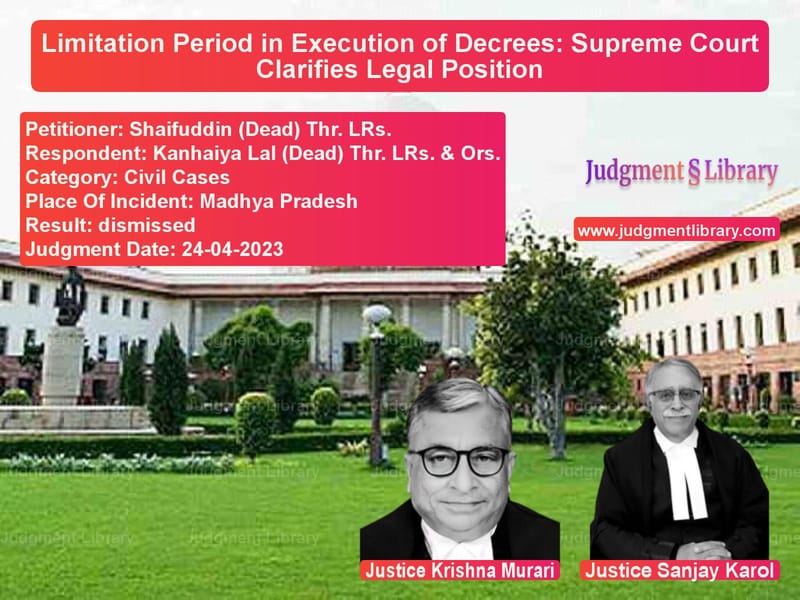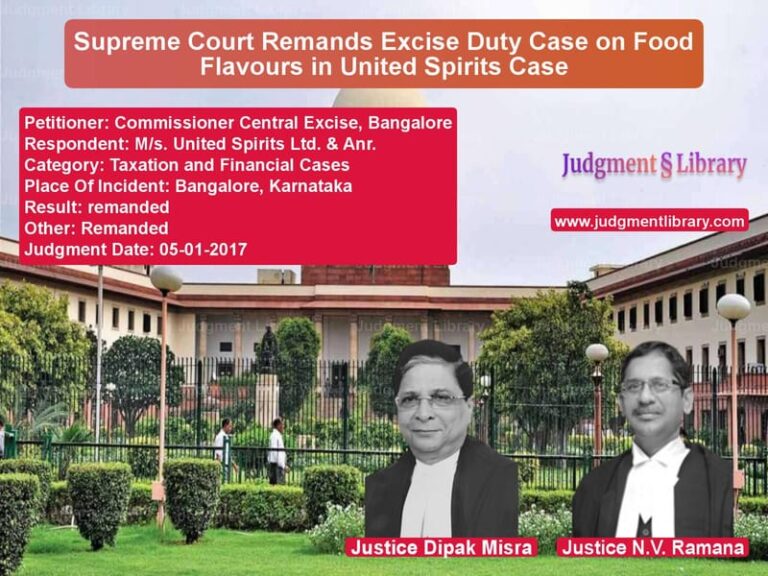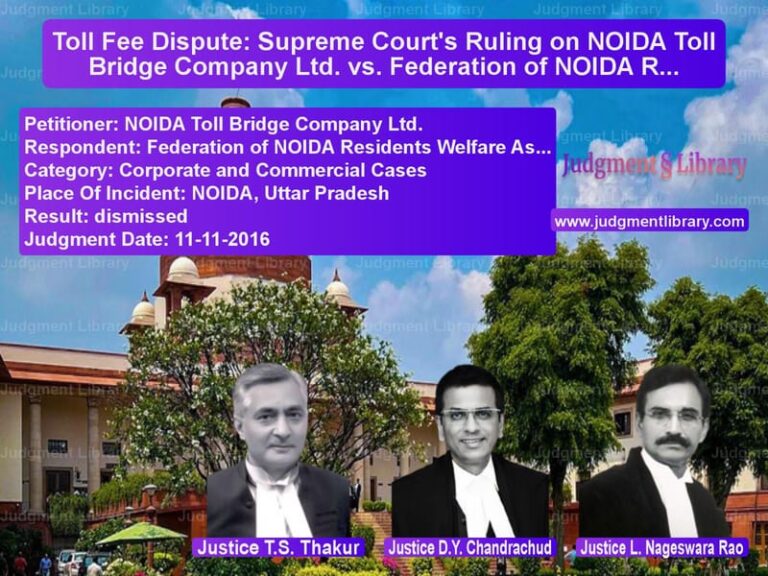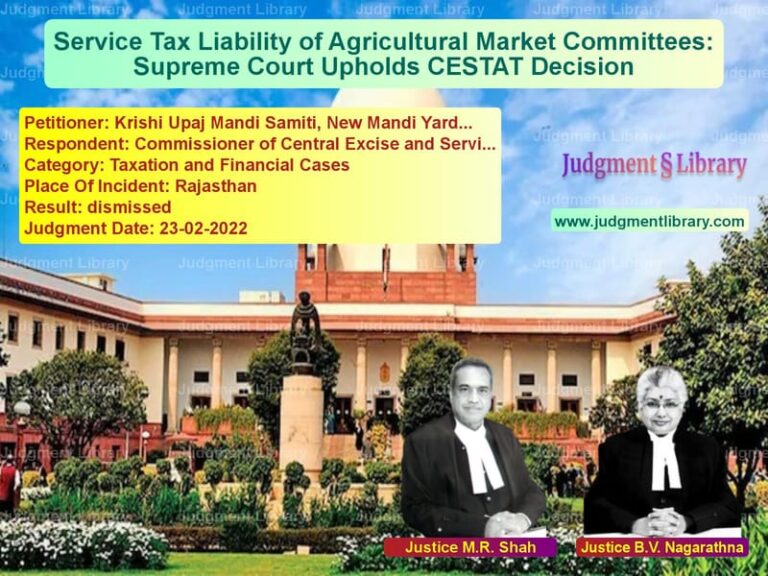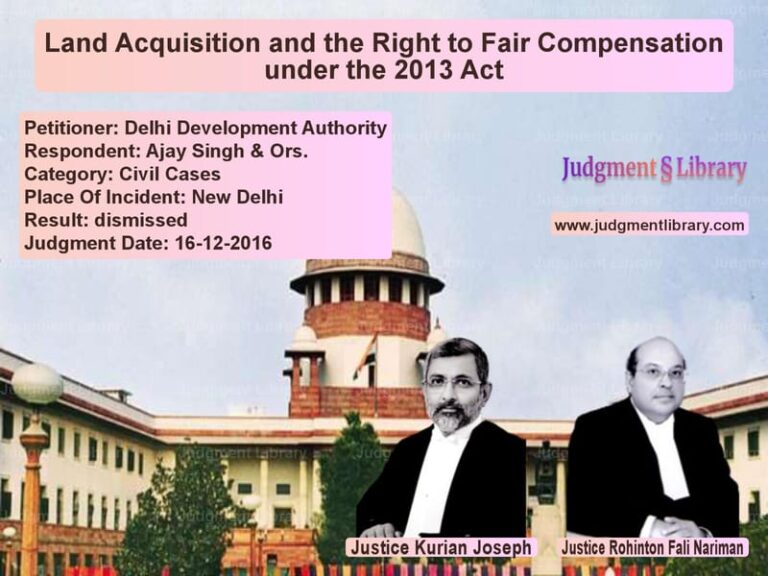Limitation Period in Execution of Decrees: Supreme Court Clarifies Legal Position
The Supreme Court of India in the case of Shaifuddin (Dead) Thr. LRs. v. Kanhaiya Lal (Dead) Thr. LRs. & Ors. examined the issue of limitation in execution proceedings under Article 136 of the Limitation Act, 1963. The ruling clarified the enforceability of compromise decrees and when the limitation period for execution begins.
Background of the Case
The dispute dates back to a compromise decree passed on 26 April 1960 in Civil First Appeal No. 11/1959, which laid down specific terms regarding the land possessed by the respondents (decree-holders). The decree stated that if the decree-holders were dispossessed, they would be entitled to alternate land from the appellant (judgment-debtor).
However, the actual dispossession of the respondents occurred decades later, and they initiated execution proceedings on 17 July 1995. The appellant objected, arguing that the execution petition was barred by limitation since it was filed more than 12 years after the compromise decree.
Petitioner’s Arguments
The appellants (judgment-debtors) argued:
- The execution petition was filed after 12 years from the date of the compromise decree and was therefore barred by limitation.
- Under Article 136 of the Limitation Act, the limitation period starts from the date when the decree was passed, not when dispossession took place.
- The High Court erred in dismissing the revision petition, as the execution proceedings should not have been entertained.
Respondent’s Arguments
The respondents (decree-holders) countered:
- The cause of action for execution arose only when dispossession took place and was confirmed in the final decree passed in Suit No. 30 A/87 on 31 March 1994.
- The execution application was filed within 12 years from the date when the decree became enforceable, making it valid.
- The compromise decree clearly stated that execution would only be necessary if the decree-holders lost possession.
Key Legal Issues
The Supreme Court considered the following questions:
- Does the limitation period for execution begin from the date of the decree or from the date when it becomes enforceable?
- Can a decree that depends on a future event (dispossession) be executed before that event occurs?
- Does the interpretation of Article 136 allow for flexibility in determining when a decree becomes enforceable?
Supreme Court’s Observations
The Court ruled in favor of the decree-holders, stating:
- “A decree or order becomes enforceable from its date unless it specifically provides for a later date.”
- “The period of limitation begins only when the decree-holder is entitled to seek execution.”
- “Clause 6 of the compromise decree was conditional on dispossession, which was confirmed by a final decree in 1994.”
- “The execution petition filed on 17 July 1995 was well within the 12-year limitation from the enforceability of the decree.”
The Court also cited precedents such as:
- Deep Chand v. Mohan Lal (2000) – Holding that limitation starts from when the decree becomes enforceable.
- Akkayanaicker v. A.A.A. Kotchadainaidu (2004) – Confirming that a decree becomes executable only when the decree-holder can act upon it.
- Bimal Kumar v. Shakuntala Devi (2012) – Emphasizing that execution depends on events specified in the decree.
Final Judgment
The Supreme Court dismissed the appeal, affirming the validity of the execution proceedings. The ruling stated:
“The execution petition is within limitation, as the cause of action arose only upon dispossession being confirmed on 31 March 1994.”
Legal Impact
This judgment establishes key principles:
- Enforceability determines limitation: Limitation under Article 136 begins from the date a decree is capable of execution.
- Future events in decrees: If a decree depends on a future occurrence (like dispossession), execution starts only when that event happens.
- Prevention of technical injustice: The ruling ensures decree-holders are not unfairly denied their rights due to rigid technicalities.
Conclusion
The Supreme Court’s ruling in Shaifuddin (Dead) Thr. LRs. v. Kanhaiya Lal (Dead) Thr. LRs. & Ors. clarifies the application of limitation laws in execution proceedings. It reaffirms that execution cannot be barred if the decree was conditional on a future event. The decision ensures that decree-holders are given the time necessary to enforce their rights once conditions specified in the decree are met.
Petitioner Name: Shaifuddin (Dead) Thr. LRs..Respondent Name: Kanhaiya Lal (Dead) Thr. LRs. & Ors..Judgment By: Justice Krishna Murari, Justice Sanjay Karol.Place Of Incident: Madhya Pradesh.Judgment Date: 24-04-2023.
Don’t miss out on the full details! Download the complete judgment in PDF format below and gain valuable insights instantly!
Download Judgment: shaifuddin-(dead)-th-vs-kanhaiya-lal-(dead)-supreme-court-of-india-judgment-dated-24-04-2023.pdf
Directly Download Judgment: Directly download this Judgment
See all petitions in Contract Disputes
See all petitions in Property Disputes
See all petitions in Specific Performance
See all petitions in Judgment by Krishna Murari
See all petitions in Judgment by Sanjay Karol
See all petitions in dismissed
See all petitions in supreme court of India judgments April 2023
See all petitions in 2023 judgments
See all posts in Civil Cases Category
See all allowed petitions in Civil Cases Category
See all Dismissed petitions in Civil Cases Category
See all partially allowed petitions in Civil Cases Category

